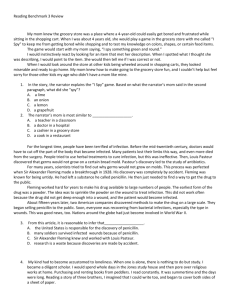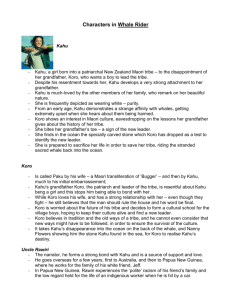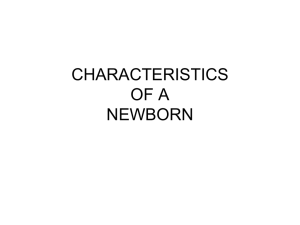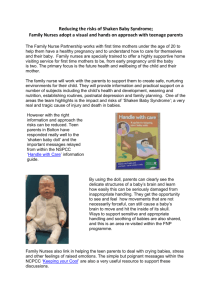KCSE English Paper 3 Marking Scheme - Kamukunji District 2014
advertisement
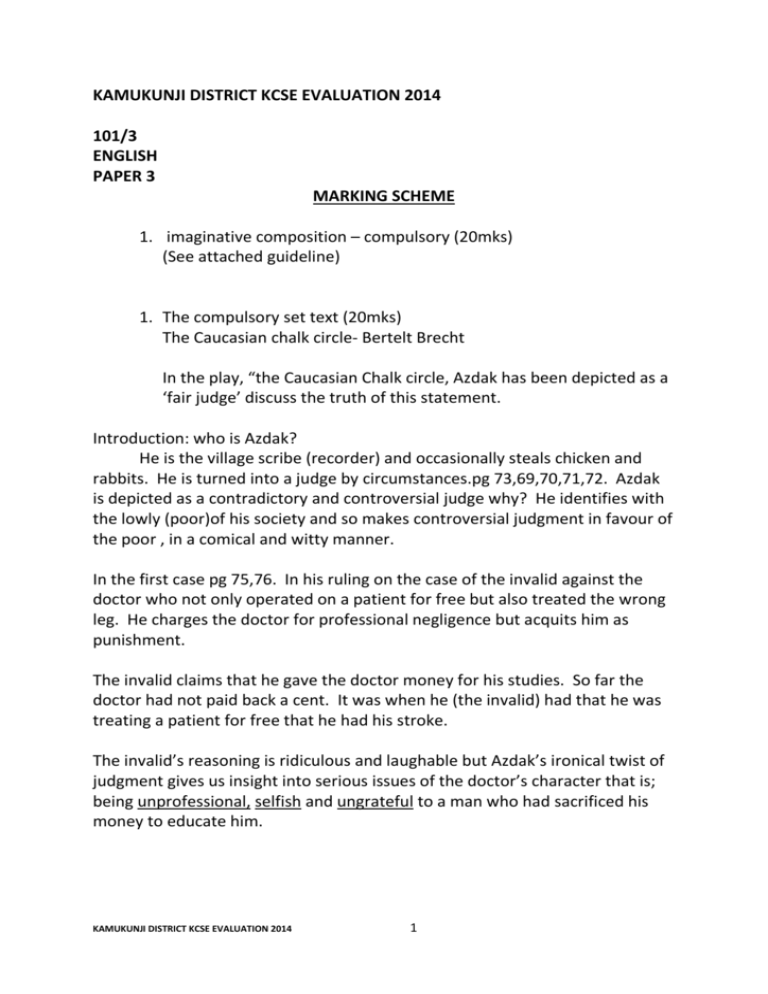
KAMUKUNJI DISTRICT KCSE EVALUATION 2014 101/3 ENGLISH PAPER 3 MARKING SCHEME 1. imaginative composition – compulsory (20mks) (See attached guideline) 1. The compulsory set text (20mks) The Caucasian chalk circle- Bertelt Brecht In the play, “the Caucasian Chalk circle, Azdak has been depicted as a ‘fair judge’ discuss the truth of this statement. Introduction: who is Azdak? He is the village scribe (recorder) and occasionally steals chicken and rabbits. He is turned into a judge by circumstances.pg 73,69,70,71,72. Azdak is depicted as a contradictory and controversial judge why? He identifies with the lowly (poor)of his society and so makes controversial judgment in favour of the poor , in a comical and witty manner. In the first case pg 75,76. In his ruling on the case of the invalid against the doctor who not only operated on a patient for free but also treated the wrong leg. He charges the doctor for professional negligence but acquits him as punishment. The invalid claims that he gave the doctor money for his studies. So far the doctor had not paid back a cent. It was when he (the invalid) had that he was treating a patient for free that he had his stroke. The invalid’s reasoning is ridiculous and laughable but Azdak’s ironical twist of judgment gives us insight into serious issues of the doctor’s character that is; being unprofessional, selfish and ungrateful to a man who had sacrificed his money to educate him. KAMUKUNJI DISTRICT KCSE EVALUATION 2014 1 2.Azdak’s 2nd case: The case between the blackmailer and the doctor. Azdak sentences the invalid to a fine of one thousand piasters and tells him that if you have a second stroke, the doctor would have to treat him for free. The blackmailer (limping), will receive a bottle of rubbing alcohol. 3.Azdak’s 3rd case: The case between Ludovica and the inn keeper. Azdak gives this sentence: “this is a case of intentional assault with a dangerous weapon! You are sentenced to hand over to the court the little roan which your father liked to ride on his son’s back. Then he invites Ludovica to the stables, so the court can inspect the scene of the crime. Thus in a twist of events, Azdak wittingly and naughtily expects the rape scene to be enacted in order to prove that this was a serious case of blackmail on the part of the blackmailer. In order to get money from the landowner, he had accused him of raping his niece (incest)….money was given to save him from the scandal. 4. Azdak’s 4th case: The case between the Bandit and the old woman. 5th case: He divorces Grusha and Jussup deliberately instead of the old couple. Why? It was Grusha who really needed to be set free from bondage of a make do marriage for convenience. She got into this marriage for a good cause to save (Natella’s baby) she is set free from Jussup a hypocrite (had feigned illness) to avoid going to war with other soldiers. Therefore, Azdak punishes him for being unpatriotic to his country. 6th case: When the baby is given to Grusha and not Natella. Why? Azdak draws a circle- the chalk circle into which the baby is put for Grusha and Natella to pull to either side so that whoever is strong, takes the baby. Natella is happy about this decision (biblical allusion to the story of King Solomon and two women) and agrees to pull the baby but Grusha refuses as this would hurt him. Azdak is wise in his ruling. The baby’s biological mother is insensitive/ uncaring towards his suffering. She is materialistic, only wants the baby for wealth (material gain) because he is an heir to his father’s property. KAMUKUNJI DISTRICT KCSE EVALUATION 2014 2 On the other hand, Grusha is emotionally attached to the baby- loving and protective though Natella’s kitchen maid deserves the baby because she displays true love for him and has maternal instincts to protect him whenever his life is in danger. Conclusion. Azdak dispenses justice to the poor and downtrodden in a manner never witnessed before in the land/society. Turned the tables upside down to give a sense of liberation and hope to the lowly in the society, to show that good will always triumph over evil. Through a song pg 82, the singer says of Azdak’s verdict: “and he broke the rules to save them Broken law like bread he gave them. Brought them to the shore upon his crooked back….. Writer’s call for change in political governance (democracy), economic liberation, and justice-through revolutionary thinking. Marking instructions: i) Candidates must give reasons why he/she thinks that Azdak is fair or not. This two sided answer. ii) For any 4 well illustrated cases award 4 marks – total of 16 marks. Introduction (1mark) Conclusion (1 mark) Language (2 marks )– for flowing/fluent essay award a total 20 marks. 2. a) the short story When the sun goes down and other stories- Eulies ‘W Olembo “Incidences of betrayal are common in our community”. Citing illustrations from the story, two sides of a house by Leila Abdouzeid (morocco) justify the above observation. Introduction – “two sides of a house” is a story based on a conflict between two women Khadija Bent Ahmed and Meeluda Bent, Al –bacheer Khadija is Meeluda’s tenant and neighbour. We meet the two women in a court room, where Khadija has sued Meeluda for evicting her from her house. - Meeluda is portrayed as a calculating and tricky character who deceives for whatever reason Khadija to vacate her house so that she could have the ceiling repaired. Why? Meeluda’s ceiling is the floor of Khadija’s house (a storey KAMUKUNJI DISTRICT KCSE EVALUATION 2014 3 building). She promised Khadija that she could come back soon after the ceiling was repaired. However, she broke the landing and demolished the stairs so Khadija could not return to the house for two years.(house was suspended in the air) All this time, Khadija was forced to live on her brother’s and sister’s mercy who accommodated her in turns. Khadija is very emotional, she cries bitterly because she attaches sentimental value to her house. Why? a) She entered the house as a bride. ii) Family had lived in it for thirty years, so the rent paid was more than its worth. iii) She wanted to spend the rest of her life there, for this is the place she calls home. The defendant, Meeluda is mean and uncaring towards her neighbour (Khadija) sarcastically, she retorts; “Big deal”,……”forty dirhams a month. What is that? It wouldn’t even buy a Kilogram of meat”. The sting of sarcasm infuriates Khadija who reveals to the court, the ungrateful Meeluda, pointing out how helpful she had been to her as a neighbours.(accept illustrations of the things Khadija has done for Meeluda pg 175,176.) From the court scene, the reader learns that Khadija is naive and trusting. She believes that Meeluda is sincere when she asks her to vacate her house for repairs to be done. She was simply trying to evict her through a trick pg 176178. Khadija experiences a sense of painful betrayal on learning that that very day when the judge ruled in Meeluda’s favour, an old woman (a divorcee) was occupying a room where she had once lived. Therefore, Meeluda’s story of a leaking ceiling was blackmail. Khadija shares her story with the old woman on the roof of the same house who in turn narrates to her another story (own experience) of betrayal from a young woman she had helped save from a great deal of trouble. The old woman had taken in a pregnant girl (out of wedlock, an outcast in her family)- culture forbids pregnancy outside marriage. KAMUKUNJI DISTRICT KCSE EVALUATION 2014 4 Out of sympathy, she takes care of the girl until she delivers twins-(boys). The old woman is portrayed as being understanding, kind and fair toward the girl. Pg 179. Reason- the old woman and the girl had signed a pact that she would possess the baby at birth. Her husband registered the boys in his family book and cleverly takes advantage of the girl’s long stay to marry her. The old woman’s sense of betrayal by her husband is expressed in these words,”I ‘ve been married to the old man for forty years, but after he saw that country bumpkin, he ignored me completely” pg 178. When the time came for the old woman to demand that the girl leaves, to her shock she removes a marriage contract and shows her refusing to leave. She Justifies her stay, “ I am here in my own house, with my children” pg 179. Sense of sarcasm/mockery, painful to a barren/childless old woman. She Experiences betrayal by a helpless young woman she had shown hospitality. Indeed, her experience confirms that the world/society is full of betrayal from people we trust. Also, there are no trustworthy relationships and that people are opportunists. (Interest is in benefiting from relationships). “There’s no good neighbour in this world, no grateful people, no faithful husbands” pg 178. NB- The above statement is cautionary to the reader. b) The play Betrayal in the city – Francis Imbuga “The tree of liberty must be watered with blood. Introduction: Betrayal in the city has been set in an independent state called Kafira. The play is based on a post independent state/nation which is struggling to make sense out of her independence. Consequently, there are issues of concern in the conscience/mind of the educated and enlightened citizens regarding the leadership of Kafira. It is evident in the text that Kagira has acquired independence but not economic independence. Expatriates still run the economy. Hence, independence is meaningless. Jusper complains that the majority only get the fruits of independence second hand d. It is also evident that the political leadership is abusing office and power a dictatorship government. KAMUKUNJI DISTRICT KCSE EVALUATION 2014 5 Other issues of concern:- Unemployment - Nepotism - Inefficiency of political leaders and dishonesty - Betrayal - Political killings/assassinations - Neocolonialism leading to the desire for change. When the play starts, a university student, Adika has been shot dead for leading a riot intended to liberate the nation (pg 14) Jusper, Adika’s brother avenges his death by killing chagaga (one of the government officials) Jusper takes over the role of leading the struggle for change and justice. Demonstrates that performing art/drama can be used to fight for social justice in a dictatorial society. He kills Mulili, the symbol of injustice in Kagira. Pg 33, 39, 62. Jusper is arrested and imprisoned. On being released, his parents are murdered so that he has no one to go back to and to also kill his revenge spirit. Mosese defies the government restrictions and in exchange Nicodems (a government official) plants optimum in his car and he ends up in jail. Jere, a soldier who is sympathizing with the villagers is arrested and sent to prison after Mulili betrayed him. Page 17. Askari in charge of the prison confesses to have killed a man in the cell. This man had been fighting for change. Regina, Mosese’s sister is beater up by the Askari when she refuses to give false evidence against the brother until she loses hearing in one ear. The struggle by Jusper, Jere and Mosese is aimed at creating a better liberated society with good governance leading to true liberty, economic achievements, progress for all and freedom of expression. In Jere’s words,”To provide a mirror for Kafira….and to sacrifice for a better future.pg 73 KAMUKUNJI DISTRICT KCSE EVALUATION 2014 6 a) The Novel Love and rejection can be a very painful experience. Introduction: the candidate must make a statement to show his/her stand. Approach: A two- sided essay. Love- Theme illustrated through the following characters. i) Nani flowers love for Kahu. A grandmother’s love; protective and possessive -Appreciative- appreciates the girl- child reason To perpetuate feminism, importance and role of a woman in the family/society. Agenda: -Kahu has royal blood; a woman in Nani’s family ancestry was an able brave leader. -Her love gives kahu happiness and confidence -Nani protects her unbiblical cord why? She perceives her to be the future leader of the Maori community. -Encourages her (Kahu) to do daring and challenges Koro Apirana for having a bias for boys. ii) Rawiri’s love for Kahu – gives her sense of belonging/security. -Encouragement and support to pursue her studies to the highest level: university. b) Koro Apirana’s rejection: – Describe incidents of rejection: Unhappy/disappointed at her birth; he wanted a male great grandchild- an heir to his chiefdom. -Unappreciative and uncaring; not protective towards Kahu -Snails at her whenever she seeks for his love and attention (biting of his toe) merely a baby! Begins a search for a male heir- found a school for boys training in the Maovi culture. -Kahu was not allowed to attend the school -She eavesdrops to listen to what goes on in the school. KAMUKUNJI DISTRICT KCSE EVALUATION 2014 7 -one day, Koro notices her and growls at her,”Go away….you have no use for me”. Hurst Kahu emotionally/gives her emotional pain. -Final rejection:- fails to attend her prize giving day at school- very painful experience to Kahu. Other painful challenges: -Diving for a stone into the deep waters of the ocean, a test the boys had failed to prove herself that a girl child is just as good -The driving of the ancient bull whale back into the sea put Kahu’s life into great danger………….almost lost her life. Lesson for Koro from the ancestors; the supernatural power was upon Kahu- a leader for the community. Thus, the author advocates a change of cultural discrimination against women. -Give opportunities to women to explore their leadership qualities. For any 5 well illustrated points, award 3 marks. Total 15 marks. Introduction – 1mks Conclusion – 1mk Language – 3mks KAMUKUNJI DISTRICT KCSE EVALUATION 2014 8
